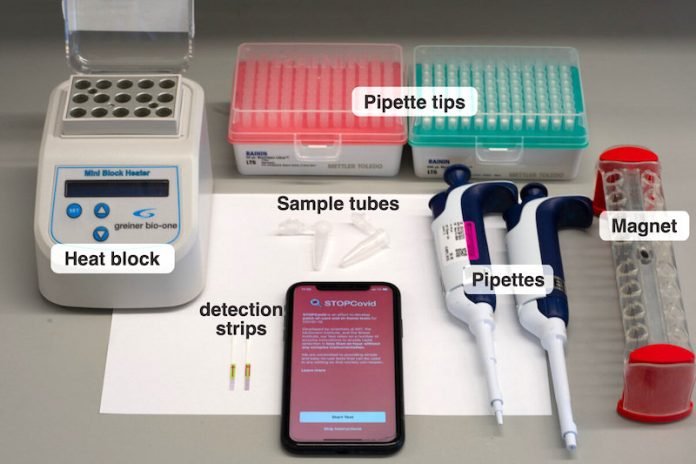
In a new study, researchers developed a CRISPR-based diagnostic for COVID-19 that can produce results in 30 minutes to an hour, with similar accuracy as the standard PCR diagnostics now used.
They showed that on a set of patient samples, their test detected 93% of the positive cases as determined by PCR tests for COVID-19.
The new test, known as STOPCovid, in principle could be made cheaply enough that people could test themselves every day.
The research was conducted by a team at MIT and Harvard and elsewhere.
The team started to work on the COVID-19 diagnostic soon after the SARS-CoV-2 outbreak began.
They focused on making an assay, called STOPCovid, which was simple to carry out and did not require any specialized laboratory equipment.
Such a test would be amenable to future use in point-of-care settings, such as doctors’ offices, pharmacies, nursing homes, and schools.
In the new version of STOPCovid reported, the researchers incorporated a process to concentrate the viral genetic material in a patient sample by adding magnetic beads that attract RNA, eliminating the need for expensive purification kits that are time-intensive and can be in short supply due to high demand.
This concentration step boosted the test’s sensitivity so that it now approaches that of PCR.
The researchers tested STOPCovid on 402 patient samples—202 positive and 200 negative—and found that the new test detected 93%of the positive cases as determined by the standard CDC PCR test.
They also showed that the STOPCovid test works on samples taken using the less invasive anterior nares swab.
They are now testing it with saliva samples, which could make at-home tests even easier to perform.
The researchers are continuing to develop the test with the hope of delivering it to end-users to help fight the COVID-19 pandemic.
One author of the study is Omar Abudayyeh, an MIT McGovern Fellow.
The study is published in the New England Journal of Medicine.
Copyright © 2020 Knowridge Science Report. All rights reserved.



